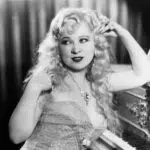Mary Jane West was born on August 17, 1893, in Brooklyn, New York, to Matilda Doelger and John West. She was an American movie actress, vocalist, dramatist, screenwriter, humorist, and sex icon with a seven-decade career in the entertainment industry. She began her career as a child star in vaudeville. She went on to write and direct her plays, which she composed and directed and for which she played her debut role on Broadway with a significant increase in ticket sales. However, she was arrested for “debasing the ethics” through one of her plays but she never gave up and continued her professional path. West received an unexpected opportunity to appear in a feature movie, “Night After Night,” in 1932, when she was just about 40 years old. After it, other successful films followed. On November 22, 1980, she passed away. Mae West only lived once, but it was enough because she did it right.
Fast Facts
Full Name:
Mary Jane West
Nickname:
Mae
Birth date:
August 17, 1893
Death date:
November 22, 1980 (age 87)
Zodiac Sign:
Leo
Height:
4' 11"
Relationship Status:
Married
Net Worth:
$1 million
Background
Mae West was born Mary Jane West in Brooklyn, New York. She was a prominent actress who portrayed a sensual, alluring woman in numerous great films and plays. Unfortunately, her sexuality and unconventional remarks frequently made her films and performances bowdlerized. She also wrote, produced, and recorded several plays and albums. Her father, John West, worked as a livery stableman, a detective, a salesperson, and a prizefighter, among many engagements. Matilda Doelger, her mother, was a model and a dressmaker.
West started singing and dancing in amateur concerts and winning local talent contests by age seven. Hence, she abandoned her formal education quickly to join Hal Clarendon’s professional stock company, where she acted as Little Nell in a lengthy melodrama. West began her career in 1901 with a Brooklyn stock company. By 1907, she had established herself as a national vaudeville performer in the vaudeville company she joined in her early teens. Franck Wallace became her song and dance partner when they met there, and she married Wallace in 1911 when she was only 16 and went unreported for more than 30 years. The marriage and the stage collaboration ended early, but they were not divorced until 1942. She spent the following 15 years alternating between vaudeville and Broadway plays and performing in nightclubs.
West began writing, producing, and starring in her own Broadway plays in 1926. Her act as a prostitute in the first of them, “Sex” in 1926, caused a storm. She was charged with “Corrupting the morals of youth” due to the play, and she was subjected to a 10-day jail sentence. She rose to national prominence as a result of this occurrence. “Diamond Lil” was a hit in1928, and “The Constant Sinner” was a hit in 1931. West’s ironic, languorous demeanor and capacity to riddle society attitudes were persistent factors in her scripts.
West relocated to Hollywood in 1932 with the release of “Night After Night” as her first film, which featured the humorous tone that would characterize her later films. “She Done Him Wrong,” a movie version of “Diamond Lil,” was released in1933 and remembered for her humorous ability to charge phrases like “Why don’t you come up sometime and see me?” with a suggestive undertone. West’s reputation soared after she wrote and co-starred in “I’m No Angel” in 1933, “Belle of the Nineties” in 1934, and “Klondike Annie” in 1936. Following two films, she was featured alongside W.C. Fields in the 1940 comedy “My Little Chickadee,” which she co-wrote with him. Allied soldiers nicknamed their inflatable life jackets “Mae Wests” during World War II in honor of her hourglass figure. She frequently appeared on stage in the 1940s and 1950s, including on Broadway in 1944 in “Catherine Was Great,” flanked by young musclemen. In the 1960s, her films were revived, and she featured in “Myra Breckinridge,” a 1970 adaptation of a Gore Vida novel, and “Sextette,” a 1978 film based on a play she authored. “Goodness Had Nothing to Do with It,” her autobiography published in 1959, was a reaction to the remark, “Goodness, what beautiful diamonds!” made by one of her characters.
Career timeline
At age 14, she begins her professional career in vaudeville with the Hal Clarendon Stock Company.
In the revues “A la Broadway” and “Hello Paris,” West makes her first appearance on Broadway.
She appears in court on charges of “corrupting the morals of youths” and is sentenced to 10 days in jail.
West makes her big-screen appearance as Maudie Triplett in the pre-Code film “Night After Night.”
West’s autobiography, “Goodness Had Nothing To Do With It,” is published, and it offers amusing stories about her profession and love life.
“Sextette” is her last movie, which also comes from a play.
Why We Love Mae West
Every night, she went home to write
According to W.C. Fields, her great male vaudevillian counterpart, West had a simple secret. He remarked she went home every night and wrote.
She invested much of her wealth in property
Unlike the figure she played on television, West lived a calm private life and put much of her money into real estate. It was a smart move, considering the longevity of a film career.
West supported women’s equality
West was vocal about being a feminist, and when asked if a woman could be a president in the 1930s, she responded, “Why not? For years, women have been running men.” Stating that from Queen Elizabeth to Cleopatra to Catherine of Russia, and a dozen more got along very fine in the leadership roles in the past.
5 Surprising Facts
She wasn’t easily identifiable off set
One of her mentors, Paramount producer William LeBron, said she was one of the few stars who could spend time out without being recognized.
She demonstrated great wit and insight
She had a wonderful wit and intelligence for crafting dialogue and overwhelming sensuality on stage and afterward in films.
She was spiritually profound and wide-ranging
Given that most of her work dealt with spiritual issues, and being a passionately and eclectic spiritual person for most of her life, her predisposition toward frankness and unorthodox free thinking on many subjects sometimes put her at variance with moralists and uncompromising religious leaders.
Honored on the Hollywood Walk of Fame
On the Hollywood Walk of Fame, West is commemorated with a Motion Picture star.
West’s phrases were absorbed into popular culture
West’s signature gestures and statements such as “Come up and see me sometime,” “Goodness had nothing to do with it, dearie,” and “When I’m bad, I’m even better” have entered the mainstream cultural vocabulary like those of only a few other stars.
Mae West FAQs
What happened to Mae West’s estate?
Mildred West, her sister, received most of her estate, including her diamonds, and a $3,500 bequest to the Mae West Fan Club of Ontario was among the other legacies.
Why is the life jacket called a “Mae West?”
The term came about because people wearing the inflated life preserver looked like the actress; it was popular and used flight gear among U.S. Army Air Forces and Royal Air Force personnel during World War II.
How did Mae West die?
West suffered a terrible fall when getting out of bed and was administered to the hospital with examinations revealing she had suffered a stroke, which left much of her right side paralyzed and ultimately led to her death.
Mae West’s birthday dates
| Year | Date | Day |
|---|---|---|
| 2025 | August 17 | Sunday |
| 2026 | August 17 | Monday |
| 2027 | August 17 | Tuesday |
| 2028 | August 17 | Thursday |
| 2029 | August 17 | Friday |











